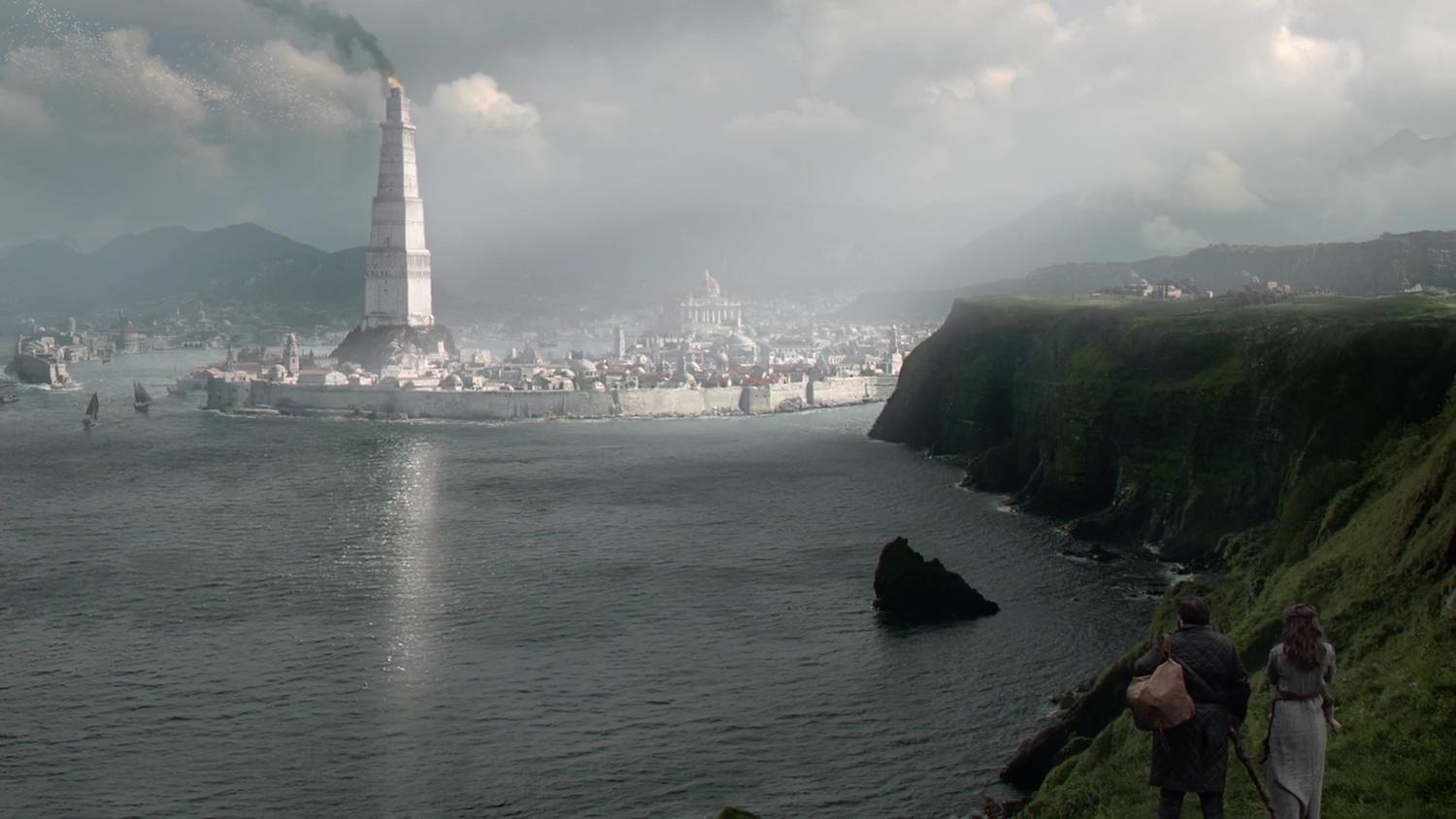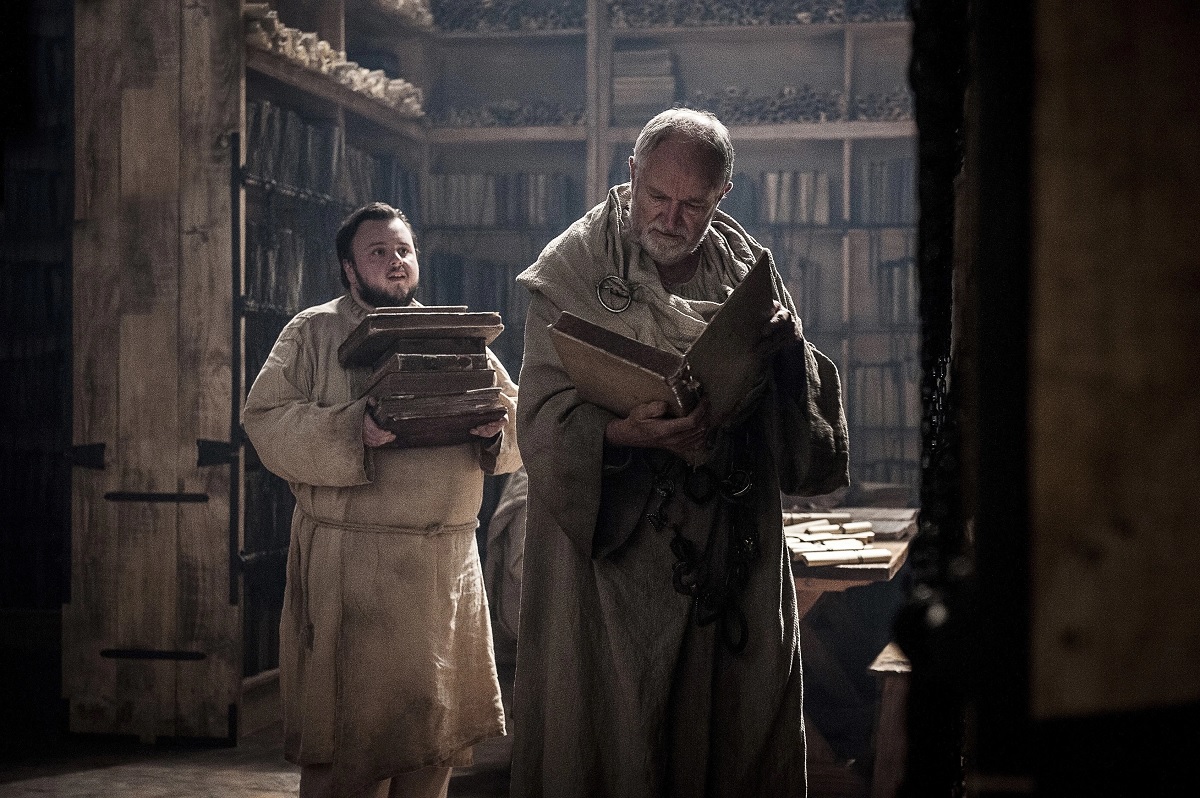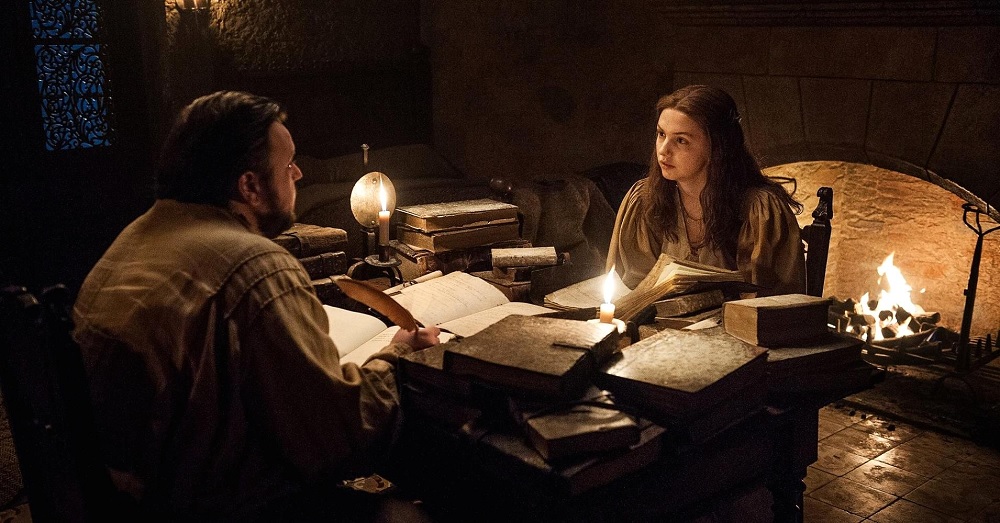Valar Morghulis! This weekly column will analyze a particular scene or two from each episode that highlight the importance of writing within storytelling. The scenes will be discussed at length and analyzed with character and overall narrative beats for the television show and the books when appropriate.
One of the greatest strengths of George R. R. Martin as a writer is his ability to understand the inherent conflicts that are born out of universal human desires. It is perhaps a bit presumptuous to assume that everyone has a desire that is comparable to that of Samwell Tarly (John Bradley) becoming a maester, but there is a universality to individuals having dreams and desires they want to see fulfilled and become a tangible reality. It does not matter if your dreams in question are more practical or fanciful (my personal list includes becoming a published novelist and marrying Oscar Isaac). It does not matter if your dreams have been imbued within your psyche for years or mere days. What ultimately matters is that those dreams exist, that they become intertwined with who we are as human beings, and they inform more of our decisions than we would perhaps like to admit.
A prominent thematic motif in Game Of Thrones is characters discovering that their dreams may not be all they had envisioned them to be and the simplicity behind that heartbreak makes it all the more profound and ruinous. When Samwell first arrived at the Citadel, it was for the expressed purpose that he would become a Maester and in the process learn valuable information that would help Jon (Kit Harington) defeat the White Walkers. But a significant part of him was truly happy that he was going to fulfill his lifelong dream of becoming one of the men who had the privilege and honor of upholding all of Westerosi knowledge. That Gilly (Hannah Murray) and Little Sam were with him made his happiness all the more profound. That profound joy he expressed in “The Winds Of Winter” makes his heartbreak in “Eastwatch” that much more devastating.
Samwell’s childhood was cloaked in the privilege of wealth but was scarred by psychological and emotional abuse. His father Randyll Tarly (James Faulkner) was a traditional patriarch through and through and his behavior towards his children exemplified that position perfectly. A bigoted man, Randyll was raised in the feudal hierarchy and believed that it was natural for men like himself to occupy the zenith of his family structure. Men like himself were supposed to be physically strong, capable of carrying a sword into battle, and ready to sacrifice themselves for the honor of their house. In Randyll’s eyes, Samwell was incapable of achieving any of those markers of manhood and he gave him a choice: he could take the black and join the Night’s Watch or he would die. Sam accepted the former, departing the grasses of the Reach for the frigid ice of Castle Black.
When he arrived at the imposing, frigid landscape surrounding Castle Black, Sam was in an even more isolating situation than he was at Horn Hill. There at least he had his sister Talla Tarly (Rebecca Benson) and mother Melessa Tarly (Samantha Spiro) for comfort. Here, he was alone amidst a motley collection of the unlucky and actual criminals. He had no fighting skills and the way some of the Night’s Watch crew looked at him, he likely didn’t imagine himself lasting much longer in that environment.
He made a friend in Jon, a man who was everything he was not. He was more of whom Randyll would have wanted as a son: a fighter, a man who could carry a sword, and who had deeply seated notions of honor and justice on account of his father Eddard (Sean Bean). Jon was handsome and beautiful in a way Samwell could not see himself and that could have easily added towards a fermenting resentment and an antagonistic relationship between the two. The two, however, found some much-needed solace in each other’s company and forged a deep friendship that is one of the series’s strongest.
Samwell had never had the confidence that he would find himself in the midst of a loving relationship. He felt that no one would look at him the way they looked at Jon or Dickon (Tom Hopper). When he was at Craster’s Keep and met Gilly, a part of him felt that longing but with her he felt more than an attraction that would lead to love, sex, and parenthood. In Gilly he found a woman of truly formidable strength, a woman who had endured countless horrors inflicted by her own unflinching father. She lacked the privilege of wealth and warmth Sam had been provided at Horn Hill and yet she persevered in circumstances whose difficulty and horror Randyll and even Sam could never comprehend.
When Samwell arrived at the Citadel, he arrived having been raised with the storied history of the great Maesters of Oldtown. When Randyll dreamed of his eldest son cutting across men with a broadsword, Samwell had dreamed of the thousands of books whispering their learned secrets into the air. He had dreamed of becoming one of the Maesters, the men who had the grave responsibility of harboring the vast knowledge of Westeros. He had dreamed of adding links onto his chain of learning and perhaps using what he would learn in the Citadel’s fabled halls for a greater good. He had never dreamed that the Maesters would be so thoroughly engrossed with hoarding their knowledge and keeping it alive as memory that they had closed their mind off to anything that would dare threaten their autonomy.
Archmaester Ebrose (Jim Broadbent) personified the austere preservation of aristocratic academic autonomy the Citadel is truly suffering from. He was on one hand a man who appreciated Samwell’s dogmatic insistences on the White Walkers, his dedication to learning, and his curing of Ser Jorah’s (Iain Glen) greyscale. On the other hand, while he appreciated that Samwell would be insistent about the White Walkers, he never was able to grasp the severity of the situation. He could never truly do so as Samwell’s words inadvertently threatened the academic authority that men such as he had. As long as something was tangible, scientific, and recordable, it was understandable. When anything went beyond that realm of understanding, it was a threat and had to be shut down.
To a certain extent, Samwell could understand that it was difficult for anyone in the South to truly understand the catastrophe that awaited them all, but the Maesters were supposed to be men of great knowledge and capability. Samwell had grown admiring these men who had dedicated their entire lives to garnering and deepening their knowledge of the world. The archaic orthodoxy of shutting down the expansion of knowledge if it crossed certain parameters of thought to Samwell was an undemocratic process. It threatened not just the authority of a group of elderly white men (the privilege rings far too true for the world of today) but the safety of all of Westeros.
Bran Stark came out of his acid trip to send ravens with the warning that the Army of the Dead was on the march near Eastwatch-by-the-Sea. The moment the Maesters received the raven, however, the discussion around the seriousness of Bran’s inquiry lasted about five minutes. Samwell jumped in with an interjection to vouch on Bran’s behalf, but the Maesters continued to be largely dismissive. When one of the Maesters decided to latch onto the dark internet theory that Daenerys (Emilia Clarke) had invented Bran’s letter to empty the South for easier conquest, everyone around the table roared their heads in immediate agreement. No one questioned why Daenerys would employ such a stupid strategy to empty the South when she had three grown dragons, but the eagerness with which they grasped onto that theory revealed an unfortunate truth about the Maesters of Oldtown.
Samwell realized that the Maesters were not nearly as concerned with the true implementation and expansion of knowledge as they were about keeping their power over it. It was at that moment when he came to understand that the dream that had kept him going for his entire life was not what he had expected it to be, far from it in fact. He knew that in that moment he faced a difficult choice: he could either continue to have his faith crumble in the service of men blinded by their arrogance and privilege or he could snap his chains from the Citadel and take the knowledge he needed for the greater good.
When Samwell charged into the Restricted Section and stole the scrolls and books he needed, there was a note of triumph in the air and in Ramin Djawadi’s score. When he approached the luminous center of the library, however, the tone quietly shifted into a morose sequence of uninhibited heartbreak. When Sam gazed upon the beauty of the Citadel, I felt his heart shatter and its vestiges drift across the air beneath the golden astrolabes. When his eyes widened in sorrow, I felt the weight of his story, his character, and of Martin’s themes all bearing down upon his shoulders. Samwell had tired of learning about the achievements of better men and he left the Citadel to achieve something of his own.
P.S. Just remember to listen to Gilly, Samwell.
Valar Dohaeris
Akash Of the Andals
The post The Writing On the Wall: The Wizard Who Wept appeared first on Watchers on the Wall.
Via http://watchersonthewall.com

![GOT_MP_091715_EP606-2805[1]](http://watchersonthewall.com/wp-content/uploads/2016/05/GOT_MP_091715_EP606-28051.jpg)
![GOT507_110314_HS__DSC3725[1]](http://watchersonthewall.com/wp-content/uploads/2015/05/GOT507_110314_HS__DSC37251.jpg)


No comments:
Post a Comment